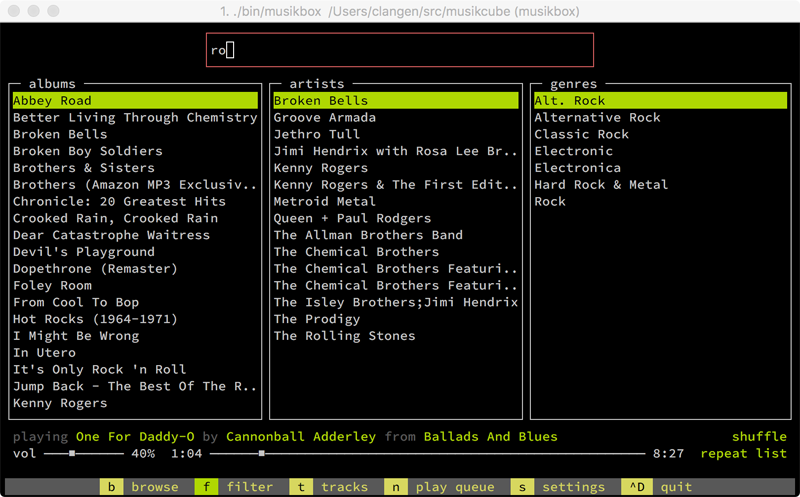| src | ||
| .gitignore | ||
| archive-macos.sh | ||
| archive-win32.sh | ||
| CHANGELOG.txt | ||
| CMakeLists.txt | ||
| CONTRIBUTORS.txt | ||
| LICENSE.txt | ||
| musikcube.sln | ||
| README.md | ||
musikcube
a cross-platform audio engine and player written in c++.
musikbox
a curses frontend to musikcube.
musicbox compiles and runs easily on windows, macos and linux. it also runs well on a raspberry pi with raspbian, and can be setup as a streaming audio server.
it looks something like this on windows:
and this on macos:
and on linux:
you can also stream audio from, or remote control musikbox using the musikdroid android app, which can be downloaded in the releases section above. it looks like this:
installation
binaries are available in the releases page.
while macos binaries are provided, you can also install via homebrew as follows:
brew tap clangen/musikboxbrew install musikboxmusikbox
raspberry pi
musikbox runs well on a raspberry pi, connected to you home stereo. see here for detailed setup instructions.
compiling
if you'd like to compile the project yourself, you can check out the build instructions.
keyboard shortcuts
a list of all keyboard shortcuts can be found in the user guide
streaming server
musikbox ships with a streaming audio server enabled by default. it runs a websocket server on port 7905, used for metadata retrieval. an http server runs on port 7906, and is used to serve (optionally transcoded) audio data to clients.
it's important to understand that, out of the box, the remote api should NOT be considered safe for use outside of a local network. the websockets service only supports a simple password challenge, and the audio http server just handles Basic authorization. it does not provide ssl or tls. the server also stores the password in plain text in a settings file on the local machine.
you can fix some of this using a reverse proxy to provide ssl termination. details in the ssl-server-setup section. while this improves things, you should exercise caution exposing these services over the internet.
if you're interested in writing your own frontend, api documentation is available here. the streaming server api uses a combination of websockets and vanilla http, and is included in every musikbox distribution.
sdk
the musikcube sdk is a set of small, pure-virtual c++ classes and a handful of enums and constants. they're still in the process of being slimmed down. you can see what they currently look like here: https://github.com/clangen/musikcube/tree/master/src/core/sdk
dependencies
musikcube would not be possible without the following excellent free, open source, and (in the case of some macos and win32 APIs) non-free projects and libraries:
| core | decoders | outputs | metadata | networking | miscellaneous | ui |
|---|---|---|---|---|---|---|
| boost | flac | alsa | taglib | websocketpp | rxjava | ncurses |
| sqlite | ogg/vorbis | pulseaudio | glide | libmicrohttpd | rxandroid | pdcurses (win32a variant) |
| utfcpp | mad + nomad | core audio | libcurl | recycler-fast-scroll | ||
| json.hpp | faad2 | wasapi | libressl | |||
| kissfft | exoplayer | directsound | nv-websocket-client | |||
| sigslot | waveout | okhttp | ||||
| wcwidth.c |



